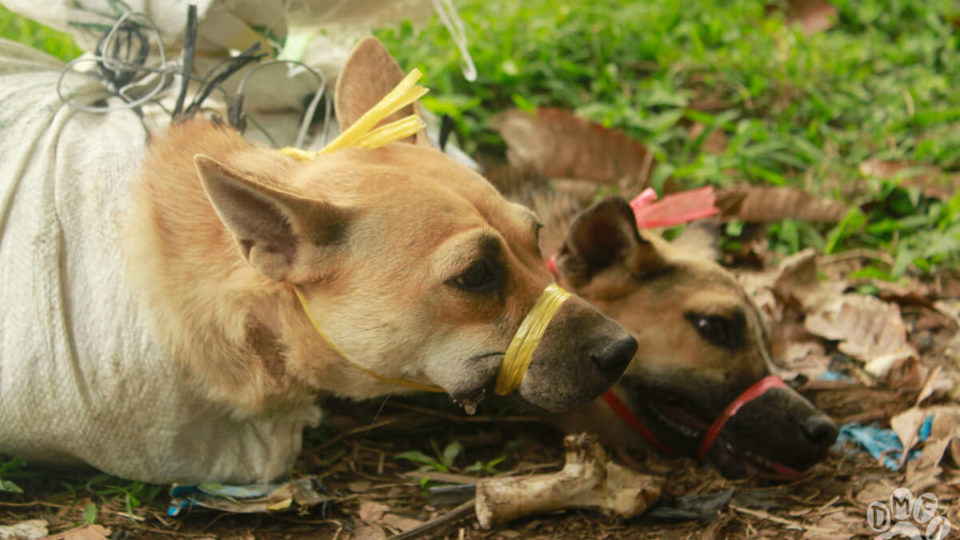Though it is not eaten widely throughout Indonesia, dog meat is popular in certain regions and demand for it fuels an industry that animal rights activists have denounced as not just cruel but also a threat to public health. Last year, activists scored a victory in getting officials from multiple government agencies to agree to work towards banning the trade.
Despite that success, the national government has yet to issue a blanket ban on dog meat, leading activists to focus on persuading regional governments to take the initiative. Yesterday, the Dog Meat Free Indonesia Coalition (DMFI) announced they scored another win with a commitment from Juliyatmono, the head of Central Java’s Karanganyar regency, to shut down all of the dog meat stalls in his jurisdiction.
According to a statement accompanying the above video, DMFI met with Juliyatmono on Monday to talk about the dog meat trade. The regent said he shares their concerns and has agreed to take “some bold steps to start immediately, including the closure of the Regency’s 21 dog meat stalls!”
After calling upon other senior government officials to follow Juliyatmono’s example, the post ends with an expression of gratitude to Regent Juilyatmono: “You are a hero!!”
Speaking to Detik, Juliyatmono confirmed his plans to close all of the dog meat stalls in his regency, citing health concerns as a justification.
“To prevent various diseases caused by dog meat, we will immediately close all dog stalls in Karanganyar,” Juliyatmono said, adding that the shut down would save about 2,000 dogs per month.
DFMI has had mixed success in lobbying other regional governments. They reported having “a disappointing meeting with the Surakarta City Government” in April, but in March they were able to get promises of action from representatives of the governor of North Sulawesi as well as the office of the mayor of Tomohon – the city home to the infamous “Tomohon Extreme Market” – which pledged a 12-month action plan that would result in the end of all sales of dogs and cats within a year.
In August, DFMI — which includes NGOs such as the Jakarta Animal Aid Network (JAAN), Animal Friends Jogja, Change for Animals Foundation and Humane Society International — made their case at the National Coordination of Animal Welfare meeting, organized by the Indonesia’s Ministry of Agriculture and attended by representatives of livestock and animal health agencies, the Indonesian Veterinary Medicine Association and related NGOs from across Indonesia.
During the meeting, DMFI coalition showed a video of their investigations into the dog meat trade and held a group meeting session to discuss it afterwards. Similar videos showing some of the most shocking and cruel aspects of the dog meat trade have helped given momentum to activists seeking a ban in recent years.
Part of DMFI’s argument was based not just on the cruelty of the dog meat trade but also its potential health dangers to humans. Just days earlier, the coalition had issued a public warning that millions of tourists to Indonesia could be at risk of rabies due to the dog meat trade.
Their arguments were apparently quite convincing. In a video from the meeting, Indonesia’s director of veterinary public health referred to the way dogs in the trade were treated as “torture”.
According to a press release by JAAN, at the end of the meeting’s closing session, all participants agreed to issue a ban on the trade of dog and cat meat in Indonesia, as well as prohibit the issuance of veterinary certificates for meat from either animal. Additionally, the results of the national coordination meeting would be used as the basis for a recommendation to the Ministry of Agriculture to formulate a regulation regarding the ban on the dog meat trade in Indonesia.
However, such a national regulation has yet to pass. So, for now, animal activists will have to keep pushing at the local and regional level to shut down the dog meat trade piece-by-piece.
DMFI has been lobbying the government heavily since the start of 2018. In January of that year, they sent a letter to President Joko Widodo calling for immediate action and the letter was signed by more than 90 Indonesian and international celebrities including Cameron Diaz, Chelsea Islan, Jane Goodall, Sophia Latjuba, Simon Cowell and Ellen DeGeneres. The coalition also has a global petition signed by more than 930,000 people all over the world.
As a Muslim-majority nation, the vast majority of Indonesians do not eat dog (it is considered haram or forbidden in Islam) but it is popular in among certain people in some parts of the country including Sulawesi, the capital Jakarta and the popular tourist island of Bali. Coconuts took a look into the dangers facing Bali’s native dogs, including the island’s illicit dog meat trade, as part of our Coconut’s TV on iFlix series.






